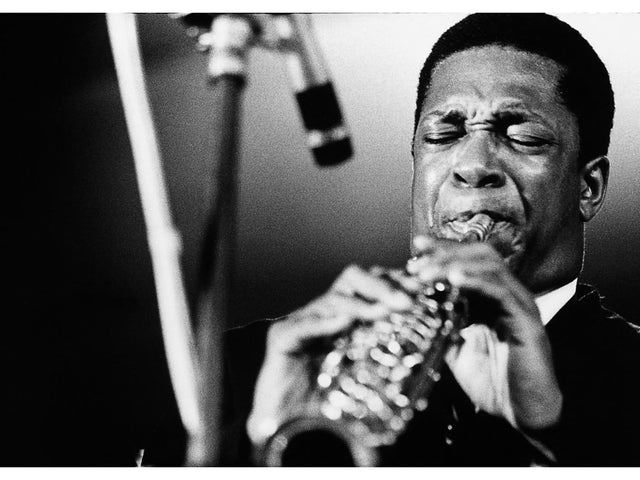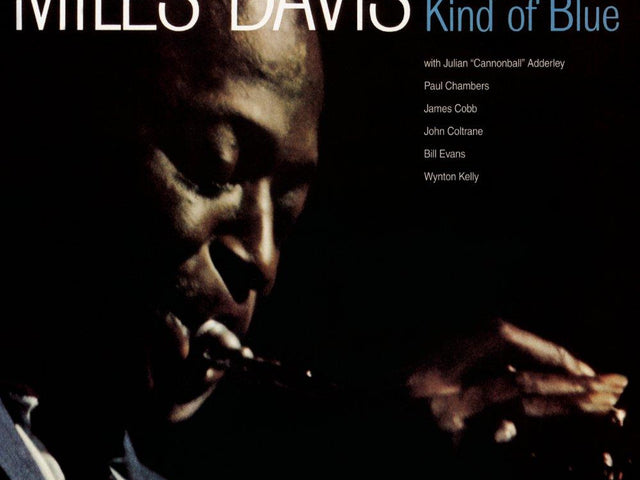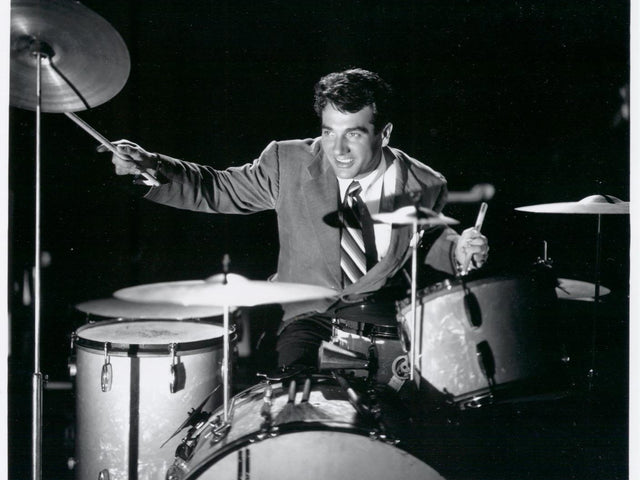Eddie Gale's Ghetto Music
The Original 1968 Liner Notes To Our New Jazz Exclusive
Today, we're happy to announce our 180g vinyl reissue campaign with Blue Note Records. We'll be doing four reissues throughout the year, and the first one is Eddie Gale's totemic Ghetto Music. You can buy it by following the link over there on the right.
We're also excited to bring you these, the original liner notes to the album written by John Norris in 1968 when the album came out. Norris was a huge figure in jazz journalism in the '60s; he started the now defunct CODA Magazine, that featured writing on basically every important jazz artist between 1962 and 2009. These liner notes will also be on the back of our exclusive, but we figured you'd want to read them if you're not sure what to make of the album.
A MAJOR musical revolution has been sweeping through the United States for several years and is now emerging to play a significant role in the life experience of the community as a whole.
One of the newcomers is a young musician from Brooklyn who made a forceful entry into the contemporary music world a short while ago with Cecil Taylor. His name is Eddie Gale, and Ghetto Music is his first opportunity to express his musical hopes and ideals. What he has to say is important in the complex world of today.
The Ghetto is a world removed from the experience of the average American, except that the inhabitants of that ghetto are also, for the most part, average Americans. The difference is that they are black, and that their heritage is vastly different to that of the rest of America.
Eddie Gale is part of this rich heritage. In this century, musical originality, creativity and expressiveness has been the language of the black man. His concepts have been absorbed into the musical mainstream time and again without so much as a genuine thank you for those contributions. The list of those who gave is long and includes Lester Young, Billie Holiday, Bessie Smith, Charlie Parker, Fats Navarro, and Eric Dolphy.
While the ghetto is often a force for evil, it is also a closely-knit community with an identity and expression of its own. It serves as an inspiration for music, theatre, and dance. Today, there is a new awareness, a new pride in the ghetto. This pride is centered around the beauty of blackness and the enormous cultural contributions of the African heritage. It can be observed outwardly in the dress, speaking habits and attitudes of today's generation. There is almost a furious drive to understand and relate to a heritage that all but disappeared under 300 years of subservience.
Eddie Gales' Ghetto Music was conceived as a full-scale musical production with costumes, acting, and dramatic presentation and is a musical reflection of his life in the ghetto. This is very much a personal portrait; for he wrote, arranged and conducted all of the music. He believes a strong foundation is essential before taking the listeners on a kaleidoscopic journey into the unknown. in Eddie's case, the beautiful melodies are the launching pad for his expeditions.
The core of the music is to be fond in the six piece band who provide the drive, momentum and expression. The musicians are only part of the total experience, however, for the 11 voice Noble Gale Singers provide a wailing counterpoint to the musical instruments giving added depth and strength to the music.
The use of voices is very different. In “The Coming of Gwilu,” for instance, the African influence is most noticeable. A pastoral calm is establish the plaintive cry of a bird whistle. It’s the beginning of a new day and a new life is coming. There is a brief duet between Eddie Gale’s soprano recorder and Russell Lyle’s flute before the music begins to develop over a repetitive, insistent beat established by the basses and percussion. Elaine Beener, the lead singer, soars as she sings the praises of this wonderful event—the coming of Gwilu, Eddie Gale’s son. The phrasing, the role of the supporting voices is very African, very hypnotic and very compelling. It parallels the work of Randy Weston and Abbey Lincoln/ Max Roach. The exultation of the chorus is contrasted with the solemn dignity of the instrumental sections.
As with any community, there are many different facets to the ghetto and these can be found in Eddie Gale’s music. “Fulton Street” is very much the hustle and bustle of “the street.” Everything here is frantic, tense and nervous. The pace is fast, the momentum intense and the movements jerky. It’s a rondo for the hipster, the hustler and the heartbeat of the neighborhood. There are spectacular fireworks from Eddie Gale as his solo explodes into motion with the energy bursting forth unchecked in flurries of note clusters. Russell Lyle’s tenor solo is similarly structured over an ever-strengthening rhythmic accompaniment. That, indeed is Fulton Street, baby.
“A Understanding” is something completely different. Its dirge-like opening immediately focuses attention on another facet of human emotion. The glitter and glamour has been replaced by the inner sadness, the ever present futility of ghetto life. The lower tones of the male singers set the stage for the somber entry of Eddie Gale’s trumpet as he gradually builds towards a high-pitched cry of anguish; a plea for understanding and compassion. There must be a change away from this way of life. It’s a moving, passionate piece of music that cuts through to the heart.
Another dimension is provided by “The Rain.” This is a joyous, lyrical exposition that features the voice and guitar of Joann Gale, who sings her own lyrics with quiet charm and sensitivity. It’s also a tour-de-force demonstration of the magnificence of Edie Gale’s trumpet playing. This is the only time the singers have actual lyrics to work with and they help build the tension and dramatic impact of the final choruses with their chanted invocation to “stop the rain.” It seems that the message of this number could well be to let the sunshine come out and smile on everyone!
Finally, “A Walk With Thee.” It opens with a military beat and spirited chanting from the Noble Gale Singers. It generates the feeling of a swaggering, firmly united populace moving forward together to claim their place in the sun. The playing captures the release that comes to a man, who has found himself and is sure of this path along the road of life. This number, in particular, expresses the frank, joyous expression of truth that is at the heart of Eddie Gale’s music, as well as fully demonstrating the worth of his fellow musicians, all unknown beyond their own locales. The two bassists and two drummers give a thick, complex undercurrent of sound that fits well the fluid senses of “time” in today’s music.
There is a totality to Eddie Gale’s Ghetto Music, a remarkable cohesion and sense of form. With Ghetto Music, Eddie Gale’s creativity has been able to blossom into a world of its own.
-John Norris Editor, Coda Magazine.
Join the Club!
Join Now, Starting at $44Exclusive 15% Off for Teachers, Students, Military members, Healthcare professionals & First Responders - Get Verified!






